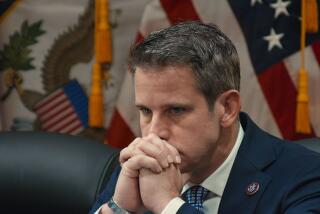Kissinger Wrong for the Job
- Share via
Few people know the corridors of power like Henry A. Kissinger. National security advisor and secretary of State to presidents Nixon and Ford a quarter-century ago, he secretly flew to China to start the process of normalizing relations, he helped orchestrate the secret bombings of Cambodia, he conducted closed-door negotiations with the North Vietnamese. He is a skilled diplomat. But he is not the best choice to head the new commission to investigate the Sept. 11 attacks.
President Bush opposed the commission and agreed to its formation only after gaining the power to pick the chairman. The Republican and Democratic sides in Congress each will appoint five members to the panel. The Democrats chose as vice chairman former Sen. George J. Mitchell, a capable mediator who helped forge a peace agreement in Northern Ireland and, like Kissinger, shuttled around the Middle East in an effort to bring peace.
But a commission investigating the worst terror attack on U.S. soil needs as its leader a tough prosecutor in the style of U.S. attorneys crusading against organized crime and jailing drug lords. The soft arts of diplomacy may have their place, but so do the tough tactics of law enforcement. This panel needs to work in the open, not in secret.
In announcing his choice of Kissinger on Wednesday, Bush said the investigation should “follow all the facts wherever they lead.” Kissinger promised to “go where the facts lead us” and to ignore foreign policy considerations. That’s good rhetoric; commission members must live up to it. Asked about Saudi Arabia, home to 15 of the 19 Sept. 11 hijackers and once home to Osama bin Laden, Kissinger said that nation was a good ally when he was secretary of State, “but that was 30 years ago.”
Although he left office with President Ford in January 1977, Kissinger has remained tightly connected to Washington power circles. His company, Kissinger Associates, is known for introducing U.S. firms looking for business overseas to leaders of foreign governments. The company does not disclose all of its clients or detail the work it does. There is the possibility of a conflict of interest in investigating foreign governments that can be beneficial to clients.
House and Senate intelligence committees are investigating the Sept. 11 attacks but an independent inquiry also is needed; one of its topics should be how well those committees exercised their oversight function before the attacks. The Bush administration had fought the appearance of government officials before the new panel but Congress rightly overrode the objections.
In determining what went wrong, the new commission needs to be truly independent, not a collection of Washington insiders protecting old friends. The stakes are too high to allow anyone to paper over blunders.
More to Read
Get the L.A. Times Politics newsletter
Deeply reported insights into legislation, politics and policy from Sacramento, Washington and beyond. In your inbox twice per week.
You may occasionally receive promotional content from the Los Angeles Times.










